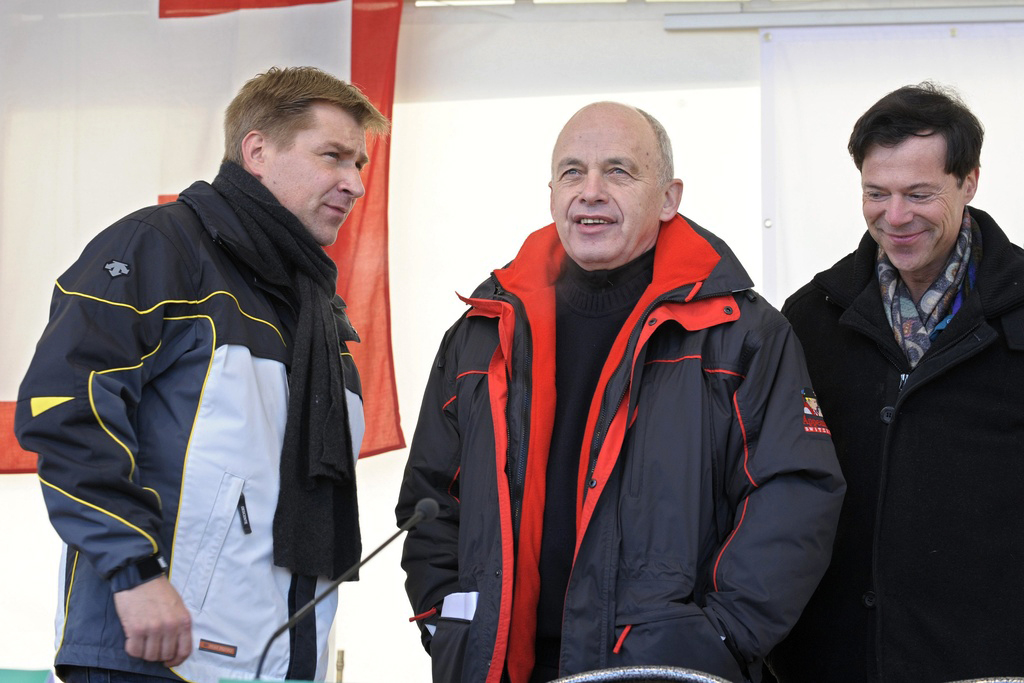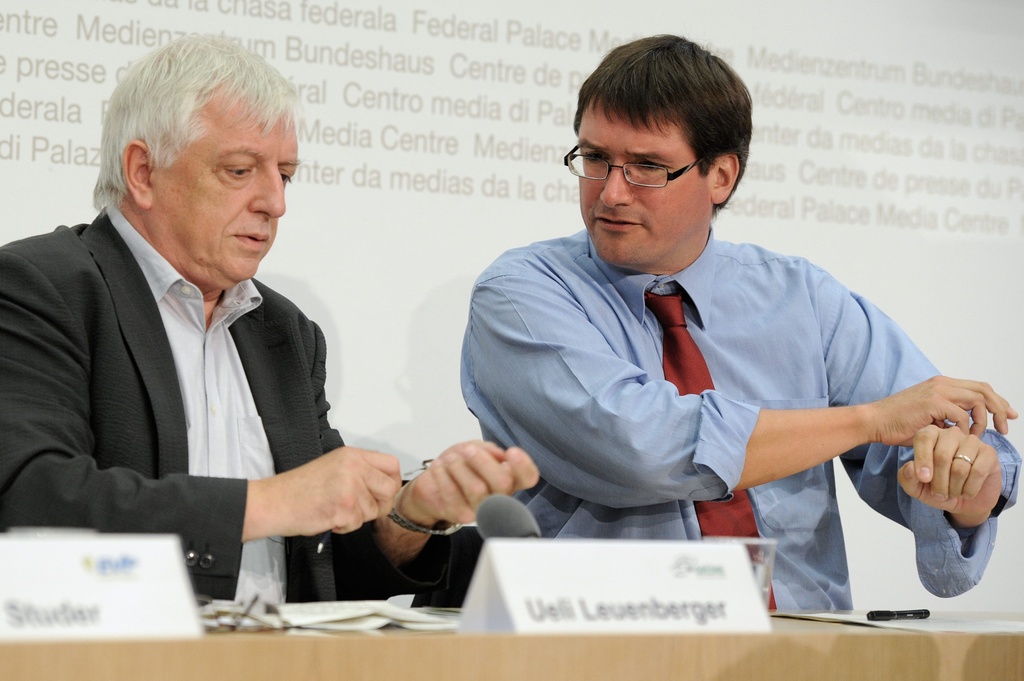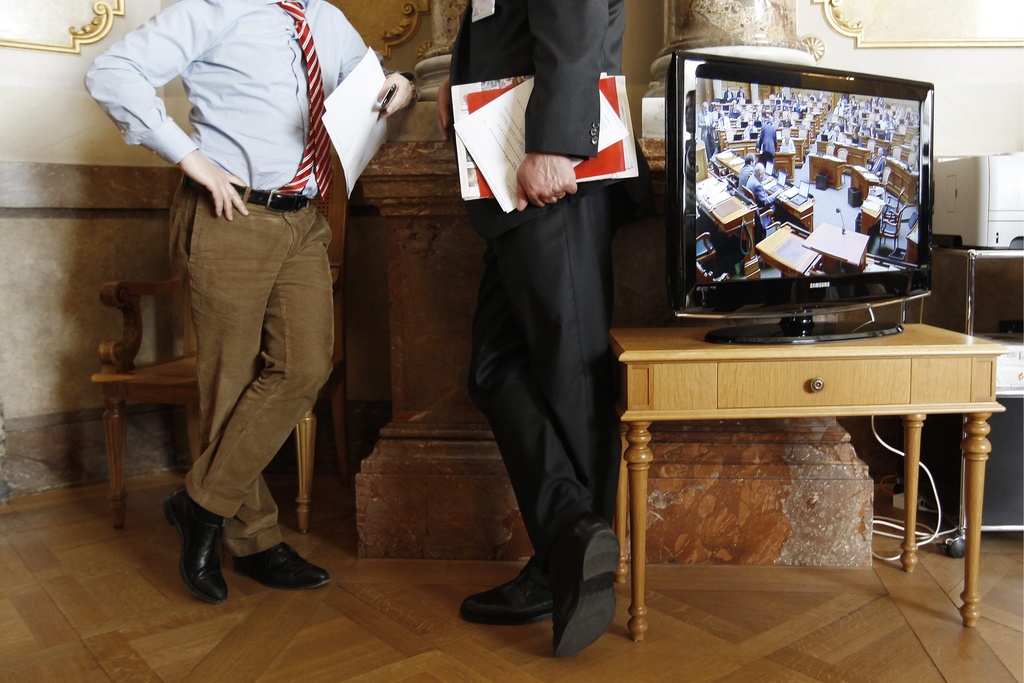Conservatives set to reinforce dominant position

The political right is aiming to capitalise on Swiss voters’ main concerns – immigration and integration – in October’s federal elections.
Experts believe that a mixture of anti-immigration rhetoric and well-organised campaigning could see the voter share of the Swiss People’s Party, the rightwing’s sole representative in the five-party cabinet, rise above 30 per cent for the first time.
“We want Switzerland in the future to remain an independent country with a high degree of self-determination by the people,” said Ulrich Schlüer, a driving force behind the party’s successful initiative in 2009 to ban the construction of minarets.
Schlüer was speaking after Swiss voters backed another People’s Party initiative to automatically deport criminal foreigners.
“Neutrality is important, but on the other hand we want to show the whole world that Switzerland is a safe country, that we do not tolerate illegal activities in our country. I think this message has a very good chance to be successful in the elections.”
This vision of Switzerland as a conservative oasis of national sovereignty amid a sea of European red tape – tightening up immigration laws is in; joining the European Union is emphatically out – continues to appeal to more and more people (see box).
Currently the People’s Party faction in parliament comprises 61 seats in the 200-seat House of Representatives (including one for the rightwing Lega dei Ticinesi and one for the rightwing Federal Democratic Union) and seven seats in the 46-seat Senate.
While the People’s Party received 28.9 per cent of the vote four years ago, pollsters suggest it’s not impossible that as many as one in three Swiss voters will back the party on October 23.
Wide appeal
So who makes up this significant minority? What does the typical People’s Party voter look like?
Unlike in the old days, when the party appealed to an older, rural, German-speaking base at the lower end of the social spectrum, the 21st-century voter comes from all walks of Swiss life.
“At the moment the People’s Party is the only political group which appeals to all sections of the population,” said Claude Longchamp, a political scientist and head of the gfs.bern research and polling institute.
“Historically, low salary earners voted left, the well-off went right. In the age of globalisation, this pattern no longer applies. It is defined instead by who benefits and who loses out in a globalised world. Losers tend to vote national conservative, winners more left, liberal.”
Nuclear disagreement
In many respects the Swiss People’s Party is a typical “drawbridge” party which wants to defend its culture against perceived alien influences and generally maintain the status quo.
“Officially, hardly anyone talks any more about joining the European Union, yet people are still sneakily pushing towards it,” Toni Brunner told swissinfo.ch.
“In such a situation, [Switzerland] needs a People’s Party that stands for the values that have made our country strong, which include independence, freedom, self-determination. That also means for us that the last word must always go to the people.”
Nevertheless, one area where the party could clash with popular sentiment is the environment. The People’s Party opposes government measures for environmental protection, such as a carbon tax, and supports the use of nuclear energy.
In the latest election poll, published on July 1, support for the party had dipped slightly to 27.5 per cent. This could be connected to the Fukushima nuclear disaster, which would have been fresh in respondents’ minds.
Campaign prowess
However, when it comes to campaigning, political analyst Georg Lutz of Lausanne University told swissinfo.ch that the People’s Party was “setting the pace” and was “way ahead” of all the other political parties in setting the agenda for October’s elections.
Lutz explains that the campaigning – closer to British or American political marketing than its more timid rivals – is based on provocation.
For example, an infamous poster for the deportation initiative, featuring three white sheep kicking a black sheep off the Swiss flag, was criticised by the United Nations for being blatantly racist. The poster was later adapted by Germany’s neo-Nazi National Democratic Party.
“I think there will be a turning point at some stage if the proposals get too extreme. It will put people off. But there have been many people waiting for this point and it hasn’t come so far,” Lutz said.

More
House of Representatives
“Saving the country”
Some people wonder whether Switzerland is in a dangerous political situation, with the People’s Party in a position to breach the 30 per cent barrier in October. Lutz says it depends who you ask.
“If you ask people from the People’s Party, they’ll tell you they’re saving the country. If you ask people on the Left, they think the situation is pretty dangerous because it brings further isolation and doesn’t solve any problems.”
For its part, the People’s Party denies it is xenophobic – despite inviting the fiercely anti-Islamic Dutch politician Geert Wilders to speak in Switzerland in June (local authorities refused to grant him permission for security reasons).
“We accept all foreigners who look after themselves, who come to Switzerland to work, accept our laws and have correct behaviour here,” Schlüer said.
The forerunner of the People’s Party represented “farmers, traders and Swiss citizens” from rural areas. At the end of the First World War it grew into an opposition movement against the Radicals and eventually won a cabinet seat in 1929. It merged with a number of smaller, regional parties to become the Swiss People’s Party in 1971.
Until the 1990s, the People’s Party was the smallest of the parties represented in cabinet, with only 11% of the vote. During the 1990s the party increased its share of the vote to become the most popular party, attracting 22.5% at the 1999 elections.
In 2003, its percentage of the vote rose again to 26.6%. As a result, the party’s leading light, billionaire Christoph Blocher, won a second cabinet seat for the People’s Party at the expense of the Christian Democrats.
The People’s Party took a record 28.9% of the vote in the 2007 parliamentary elections – the best result for a political party in Switzerland since 1919. However, parliament voted Blocher out.
In 2008, Blocher’s cabinet replacement Eveline Widmer-Schlumpf and Defence Minister Samuel Schmid were thrown out of the People’s Party, accused of betraying Blocher. Both joined a new party, the centre-right Conservative Democratic Party. The People’s Party thus had no representation in the cabinet and went into opposition.
In December 2008, the People’s Party returned to the cabinet when Ueli Maurer was elected to replace Schmid, who retired.
The new party programme is called: “Swiss People’s Party – the party for Switzerland”.
It is the core message of the party for the federal elections in 2011 until 2015.
The programme includes the usual party messages: “No” to membership of the European Union, tougher penalties for criminals, prevention of mass immigration and a strong army.
Party delegates demand Switzerland leave the Schengen area, the Lötschberg rail tunnel be further developed and the introduction of tougher laws against those people who have no valid identity papers.
(With input from Robert Brookes and Andreas Keiser)

In compliance with the JTI standards
More: SWI swissinfo.ch certified by the Journalism Trust Initiative




You can find an overview of ongoing debates with our journalists here. Please join us!
If you want to start a conversation about a topic raised in this article or want to report factual errors, email us at english@swissinfo.ch.